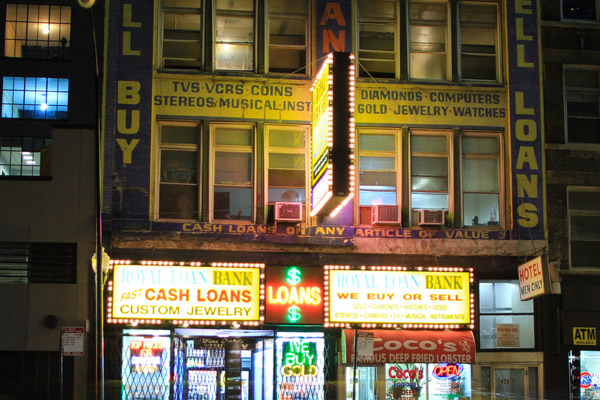
* Mick Dumke leads off the Reader this week with a lengthy piece on a local battle over a pawnshop in the 18th ward at 79th and Western. But it's much more than that: an examination of how development is hashed out between residents and aldermen, how people perceive neighborhood tipping points, the powers of ward remapping, what kind of businesses people are willing to accept and why in an economic downturn, and the leverage those businesses have:
EZ Pawn has enlisted Reyes Kurson, the firm founded and led by Victor Reyes, once the top political aide to former mayor Richard Daley. Cash America hired Chico Nunes, whose partners include former Daley aide and mayoral candidate Gery Chico. For help with the zoning changes they need, they brought on the Del Galdo Law Group, a firm that's been hired to represent several suburban governments at the behest of state house speaker Michael Madigan.
[snip]
When another resident wanted to know why Cash America had decided to set up a store in the 18th Ward, one of the reps candidly said the company focused on communities with median incomes of $40,000 or less. It upset almost everyone in the audience—most of them earn much more, and those who don't were even more offended.
* For more on the subject, I recommend Gary Rivlin's Broke USA, a book-length examination of pawn shops and payday lenders. (Rivlin, a former Reader reporter, is justly famous for his book on Harold Washington, Fire on the Prairie, but also excellent is Drive-By. It's a slim but rich examination of a single drive-by shooting, like a good true-crime magazine article expanded in scope to touch on race, class, and history in Oakland. It's a bit like a miniature Common Ground, and an undersung gem of crime reporting).
* The mayor announced an ordinance that would designate parking spots for food trucks, and the Trib has a map—north of the Loop to Wrigleyville, west out to Ukrainian Village. I'm a bit surprised there are none in Hyde Park, which is notable for its density combined with an absence of good food.
* Sudhir Venkatesh has an editorial on kids, guns, and gangs in Chicago for the New York Times that sums up his research on the subject (which I mentioned yesterday), and touches on his preferred policy solutions, which should sound familiar (emphasis mine):
A second problem with current policy is the lack of support for mediation programs. In Boston, the interfaith Ten Point Coalition, co-founded by the Rev. Eugene F. Rivers with police support, helped reset relations between the community and law enforcement. Then the criminologist David M. Kennedy brought in his Ceasefire program, which brings street-based mediators and cops into productive discussions with gang members and would-be criminals. Gang violence sharply declined through both efforts, and Mr. Kennedy’s experiment has been successfully replicated in other cities.
But many police chiefs have been reluctant to embrace such efforts. They fear that mediators will usurp their authority and become vigilante citizen patrols. Charities are reluctant to support mediation efforts because of a mistaken view that philanthropy should not get into bed with law enforcement. The fact that criminal justice programs receive less than 1 percent of total philanthropic giving should alarm us.
Who knows? Perhaps criminal-justice programs will be the new charter schools. Venkatesh also makes an interesting argument for the effectiveness of controversial gun-buyback programs that's not what you might guess. If his suggestions for getting guns off the streets come across as a bit unsatisfying, it's because their sources are many and difficult to cut off.
* In the Chicago Journal, Igor Studenkov looks at the little urban island at 25th and Wentworth, the remnants of an old Italian neighborhood dislocated by highways and now sort of a part of Chinatown, and finds a hardware store that dates back to the 19th century.
* Chicago's South Side, 1946-1948.
* Cities are starting to tolerate helmet-free riding, which might just be inevitable as bike-share programs expand.
Photograph: juggernautco (CC by 2.0)


